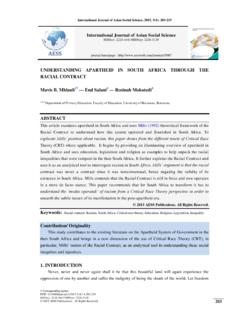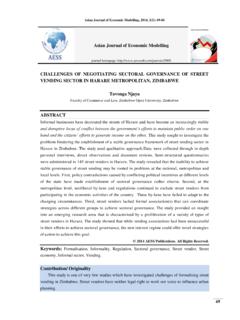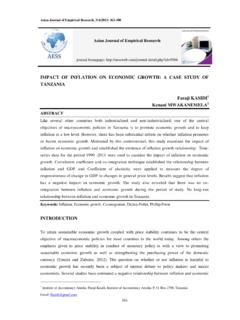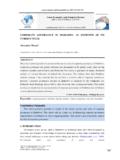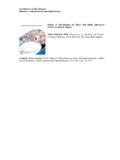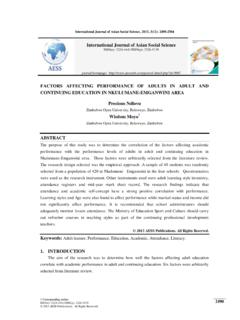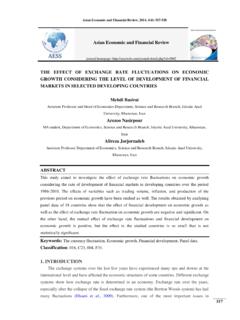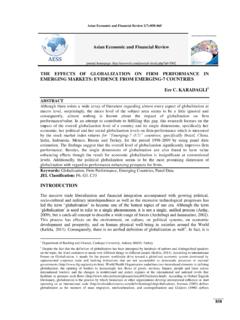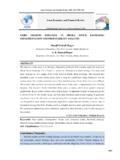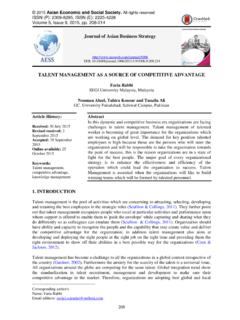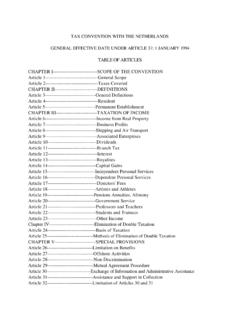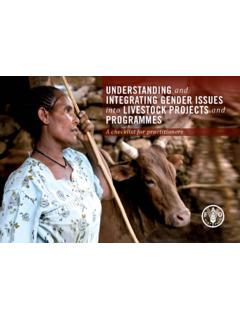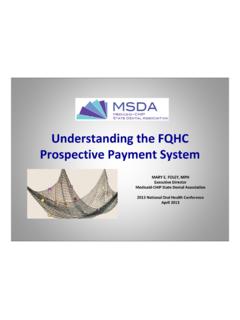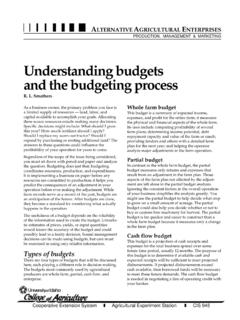Transcription of SUPPORT PROVIDED BY HEADS TO TEACHERS …
1 International Journal of Asian Social Science, 2013, 3(7):1485-1499. International Journal of Asian Social Science ISSN(e): 2224-4441/ISSN(p): 2226-5139. journal homepage: SUPPORT PROVIDED BY HEADS TO TEACHERS IMPLEMENTING A NEW. CURRICULUM WITH SPECIFIC REFERENCE TO HOME ECONOMICS IN. PRIMARY SCHOOLS IN ZIMBABWE.. Tichaona Mapolisa Department of Educational Studies, Faculty of Arts and Education, Zimbabwe Open University, Zimbabwe Thembinkosi Tshabalala Faculty of Arts and Education, Zimbabwe Open University, Zimbabwe ABSTRACT. Home economics is a relatively new subject in Zimbabwe, having been introduced in the late 1990s. Before then, most schools offered subjects like Carpentry for boys and Domestic Science for girls.
2 These subjects were taught by specialist TEACHERS and as such, did not involve ordinary classroom practitioners. Home Economics seeks to develop in the youths an appreciation of their role in the solution of their own problems, and in the maintenance and upgrading of their living environment. Home Economics is aimed at promoting understanding of basic concepts of nutrition, hygiene, clothing, consumerism and family life. Pupils in the end learn to cook, do craftwork, launder their clothes, clean the home environment, improve sanitation levels in the school and community, plan their time and use it efficiently, budget their income, behave in acceptable ways, conserve resources and be good consumers.
3 Important as Home Economics may appear to be particularly in the eyes of the policy makers, its introduction meant that TEACHERS taking junior classes found themselves teaching as many as eleven different subjects in a single day. This may lead to an indifferent attitude among some TEACHERS towards the new subject and hence that the subject does not receive the attention and importance it deserves. The introduction of Home Economics in the primary system in Zimbabwe represents a change. Its successful implementation will take time and move through a series of phases. It requires changing TEACHERS '. attitudes and feelings. It also requires that TEACHERS ' capacities be built in order to improve their mastery of the new content and teaching strategies.
4 In the Zimbabwean context, the principal /. head is at the centre of the implementation of all new curricula at school level. In view of the above, this study sought to establish the SUPPORT PROVIDED by HEADS to TEACHERS as they implement the Home Economics curriculum. The study employed the descriptive survey method. The study was conducted in Nkayi District in Matabeleland North in Western Zimbabwe. Random sampling Corresponding author ISSN(e): 2224-4441/ISSN(p): 2226-5139 1485. 2013 AESS Publications. All Rights Reserved. International Journal of Asian Social Science, 2013, 3(7):1485-1499. was used to come up with a sample of 59 headmasters/mistresses from a total of 120 HEADS in the district, and 82 TEACHERS from a total of 1000 TEACHERS in the district.
5 Data were collected by means of a semi-structured questionnaire. The main findings revealed that principals had no clear vision of the new curriculum. There is little effort put by principals towards the provision of resources, supervision of TEACHERS is inadequate, there is no provision of technical assistance to TEACHERS on the new curriculum. HEADS , however, do make attempts to remove blockages which may inhibit the progress of implementation of the new curriculum. Based on the analysis of data, conclusions and recommendations were made. 2013 AESS Publications. All Rights Reserved. Key Terms SUPPORT Implementation Curriculum TEACHERS Home Economics HEADS Primary Schools 1. INTRODUCTION.
6 According to the Home Economics Syllabus (1994) Home Economics seeks to develop in the youths an appreciation of their role in the solution of their own problems, and in the maintenance and upgrading of their living environment . The teaching of this subject is closely linked to life problems and situations in the pupils' homes and communities. According to the then Secretary for Education, Sibanda (1994) the country was experiencing a high-level of drop- outs from the primary school. Hence, there was a need to train pupils at an early age in skills for decision-making, self-reliance, design and resourcefulness . To emphasise the necessity of the subject, the then Minister of Education 2007 declared that TEACHERS are called upon to give the subject its rightful place in the primary school system that realises the important role it plays in the lives of the pupils.
7 Home Economics is aimed at promoting understanding of basic concepts of nutrition, hygiene, clothing, consumerism, and family life. Pupils in the end learn to cook, do craftwork, launder their clothes, clean the home environment, improve sanitation levels in the school and community, plan their time and use it efficiently, budget their income, behave in acceptable ways, conserve resources and be good consumers. It is against this background that Home Economics must be taught to all primary school pupils in Zimbabwe. Important as Home Economics may appear to be, particularly in the eyes of the policymakers, its introduction meant that TEACHERS taking junior classes found themselves teaching as many as eleven different subjects in a single day.
8 This may lead to an indifferent attitude among some TEACHERS towards the new subject and hence that the subject does not receive the attention and importance it deserves. The syllabus of this subject demands that TEACHERS improvise adequate teaching / learning aids. However, there are TEACHERS who are either under qualified or who were trained before Home Economics was introduced at teacher training colleges. Home Economics is a 1486. 2013 AESS Publications. All Rights Reserved. International Journal of Asian Social Science, 2013, 3(7):1485-1499. practical subject and requires adequate materials. HEADS should take the responsibility of ensuring that these are available to their TEACHERS .
9 The subject requires sewing machines, stoves, needles, pins, first aid kits, food stuffs like spices, soups, icing sugar, baking powder, kitchen equipment and utensils, as well as special rooms for effectively teaching the subject. Home Economics is not an examination subject at the end of the primary school. As a result, HEADS may have a tendency to concentrate their SUPPORT of TEACHERS on examination subjects like Mathematics, English, Ndebele /. Shona and General Paper. Lack of principal SUPPORT and materials may force TEACHERS to end up teaching the theoretical aspects of the subject which may not be adequate to achieve the goals of the curriculum. The effective teaching of Home Economics calls for maximum SUPPORT of TEACHERS by principals or HEADS of schools as they attempt to implement the new subject.
10 The head is key to the effective implementation of a new curriculum and is closely linked to the amount of SUPPORT TEACHERS receive. This SUPPORT comes in various forms like providing information about the new curriculum, development of TEACHERS ' individual skills, building relationships, provision of materials, and negotiating financial SUPPORT from education authorities. The introduction of Home Economics in the primary system in Zimbabwe represents a change. Its successful implementation will take time and move through a series of phases. It requires changing TEACHERS ' attitudes and feelings. It also requires that TEACHERS ' capacities be built in order to improve their mastery of the new content and teaching strategies.
